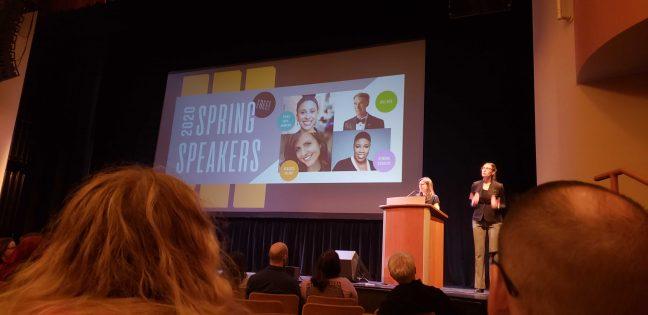Bestselling author Rebecca Skloot discussed the intersection of science, sociology, medicine and ethics, as well as her journey into writing for the Wisconsin Union’s Distinguished Lecture Series, Wednesday.
Skloot wrote “The Immortal Life of Henrietta Lacks,” an investigation into the woman behind HeLa cells, a line of self-replicating cells which heralded medical breakthroughs for several diseases.
Skloot said Henrietta Lacks, a poor black woman with cervical cancer, sought treatment at John Hopkins in 1950s. The doctor treating her, without her consent, took part of her tumor and gave it to his colleague, a man named George Guy, to study.
Unlike any cells they’d studied before, these cells didn’t stop dividing, and Skloot said her cells made medical discoveries from polio treatments to in-vitro fertilization to the development of popular cancer drugs. The HeLa cells have even been to space, Skloot said.
“There isn’t a person out there who hasn’t personally benefited from her cells,” Skloot said.
But Skloot said Lacks’ family never knew about her cells and their medical potential — at least not until years after she’d died at age 31 from her cancer. They’d never received any kind of compensation for their mother’s cells. Scientists eventually returned to the Lacks family, Skloot said, to collect samples from her children.
Skloot said the scientists testing the Lacks children encountered several barriers. None of the Lacks children had a solid science education, and the scientists didn’t stop to check in with them to make sure they understood what was going on.
“We all, in some ways, take for granted our science education,” Skloot said. “But there are many people who don’t have access to that education … nobody stopped to ask.”
Skloot said Lacks’ race and socio-economic situation complicated the situation. The public ward where Lacks sought treatment treated mainly poor people and minorities, and the hospital’s rationale at the time, Skloot said, was that because they offered free medical care, they could do research or take samples freely.
Skloot also said the Lacks family lost trust in scientists and others coming to them about the HeLa cells after a con artist attempted to steal their medical records. When Skloot first called Henrietta’s daughter Deborah about her idea for a book, Deborah shot her down because she didn’t believe Skloot’s interest was honest.
About a year later, when Deborah finally agreed to help Skloot write the book, Skloot said Deborah’s passionate curiosity about her own mother inspired her to keep writing and uncover the entire story.
“We were both driven by this curiosity,” Skloot said. “What happened to Henrietta? Who was she and why doesn’t anyone know about her?”
Professor describes the science behind science communication
Skloot said the most important thing she’s learned throughout her career is to stay curious and follow questions she has. She first learned about Lacks in a biology course she took at age 16, and ended up publishing her book 25 years later in 2010. She attributes her success to following her initial curiosity throughout the years.
In 2013, a group of scientists sequenced the HeLa genome and published it online, which Skloot said raises privacy concerns for the Lacks family. As soon as she learned about it, Skloot called one of Henrietta’s daughters.
“You can learn a lot about Henrietta in the sequence of her genome,” Skloot said. “[The Lacks family is] so proud of [the cells], and everything they’ve done with the science, but they were so done with their family being thrust into research.”
After speaking with Henrietta’s daughter, Skloot got the genome taken down from the internet. Skloot, Director of the National Institute of Health Francis Collins and several other scientists created a commission to work with the Lacks family.
The family decided they still wanted scientists to do research with the HeLa cells, but they wanted some part in controlling who could and the levels of access people could have to the genome. Now there’s a committee of experts, including Lacks family members, that moderates the cells, and all research published must acknowledge Henrietta as the source of the cells.
“This is the first time in history that research subjects … played a part in the scientific process in this way,” Skloot said. “And that’s what Henrietta wanted, that was her biggest desire, she wanted future generations to not have this problem.”


















